A Revolt in Corsica
A Short History of how Corsica Came to be on Fire
“There was a clash with the Corsicans in Corsica, where the praetor Marcus Pinarius killed some 2000 in battle. The defeat obliged the Corsicans to give hostages and 100,000 pounds of wax.” - Livy [XL.34]
Dramatic things are happening in Corsica:
If anything much of this footage is more dramatic than what we’ve seen from Ukraine:
Controversial right-wing journalist Andy Ngo is one of the only people I’ve seen covering this in English. Here someone attacking an ATM with heavy construction equipment:
Here is an incredible compilation:
As you can see, this is more than just rioting or some bad actors. This is a huge amount of people calling the French state murderers and demanding Corsican independence: this is a full-on revolt within the French Republic. You could be forgiven for not having heard of this, I only happened to run into something on Twitter. [Sadly, this was exactly the sort of thing RT always provided great coverage of in the before time.] So what is going on? Why is Corsica on fire?
I’ll start from the beginning, being as our country is notorious for poor education in history and geography and regardless Corsica is a distant and relatively small place.
Corsica is a beautiful, rugged, restive island in the northwest Mediterranean, perhaps most famous as the birthplace of Napoleon Bonaparte. The short story of its early history is that it was colonized by the Greeks who were pushed out by the Phoenicians, and is then thought to have been seized from the Phoenicians in 237 BC, after Rome reneged on the treaty which ended the war [Polybius, I.88]. [Corsica is generally overlooked due to it’s larger neighbor Sardinia, which Rome administered as one province. The record only says they seized Sardinia, but there are no references to Phoenician control of Corsica after that point.] The island was of little economic value, as evidenced by the fact that they paid their indemnity to the Romans in an enormous quantity of wax [a valuable commodity, but a strange thing to give as an indemnity.] The island has little arable land and few mineral resources: it has always been poor, egalitarian, feisty. Rulers have generally only held nominal control over the mountainous interior.
After the fall of the Western Roman Empire, Corsica passed between the control of various powers which contested the Mediterranean, ending up as a possession of the Republic of Genoa for five centuries. Due to the difficulty of controlling the island and serious financial problems, the right to administer [tax] the island was leased to the Bank of Saint George as a security on public debt- thus literal moneylenders had direct control of the island. Various internal and external conflicts wracked the island for centuries to come, until in 1755 a nationalist leader named Pasquale Paoli declared the Corsican Republic and restricted Genoese forces to a series of coastal forts. Eventually, after years of self-rule, the Genoese sold [the right to claim] the island to the French crown, who quietly replaced the Genoese in forts and then launched a full-scale invasion of the island. There was various instability and international posturing, but Britain chose to not intervene, and besides briefly being a dependency of the British Crown during the Revolutionary era, Corsica has been owned by France ever since.
Here is a short video explaining how Corsica came to be owned by France:
And also a video discussing the modern relationship between Corsica and mainland France:
Like other Mediterranean Islands, Corsica has had long-term problems with violence and organized crime. [As explained in the excellent Italian novel “The Leopard”, the organizations arose because the islands were constantly facing new invaders and had to take care of themselves.] The Corsican Mafia, known to US law enforcement as the Unione Corse, became immensely powerful and was the most important power in international narcotics trafficking in the 1970s. Corsican gangsters the most powerful in the nearby ancient port city of Marseilles, where they processed heroin for shipment to America in what famously came to be called The French Connection. Though organized crime is said to have fallen in power, it seems just as likely their power is now more integrated into the legal economy and that they have improved at concealing their activities.
In 1976, Corsican Nationalists formed the National Liberation Front of Corsica [FLNC]. This group is similar to other European nationalist groups such as the Irish Republican Army and or the Basque region’s ETA. The FLNC is believed to have been involved in crimes such as robberies, bombings, and political assassinations. The group disarmed in 2016 following a pledge to do so in 2014. However, in 2021 for a variety of reasons splinter factions of the group threatened to re-arm, citing the arrogance of the French government and the lack of progress towards long-time objectives.
Meanwhile, on the legal side of things, Corsican nationalists achieved a major victory in the 2017 elections. The nationalists demanded the release of “political prisoners”, Corsican as an official language, and a residency requirement for buying property. [As to the last point, vacation homes have driven up housing values on the island, pricing out locals.] Little progress was made with Macron, as these demands go against the heavily centralized nature of the Fifth Republic, where Corsica already has the special status of having its own legislature with limited autonomy.
This then, was the state of affairs when nationalist leader Yvan Colonna was attacked by an Islamist terrorist in prison on March 3, 2022; he is in a coma. [There are rumors he died today, the 14th, but nothing credible.] Yvan Colonna is convicted of the 1998 murder of the Corsican prefect [police chief] Claude Erignac, a charge which he has always denied. After a five year manhunt, he was found working as a shepherd in the mountains of Corsica. He was convicted in 2007 and has been in prison since.
While violence in prisons happens, this is especially bad for the French government as there is a widespread belief that Colonna is innocent [I’m in no position to comment on that]. More importantly, nationalists have been advocating for repatriating Corsican prisoners to Corsican prisons for years, specifically stating that they are threatened by Islamist gangs. [There is an excellent French prison film titled A Prophet, which covers aspects of this.] Colonna’s transfer was repeatedly denied, calling him a “Detainee of Particular Interest” and saying he was thus ineligible for a transfer. [After the attack, this status was lifted for him and his convicted co-conspirators.] Nationalists are placing blame squarely on the French government, with some parties using the slogan “Statu Francese Assassini” [“French State Assassin”] and seemingly going as near as they can to directly accusing the state of hiring the assassin without running afoul slander laws.
From the very moment that the attack on Colonna was reported the Corsicans flooded into the streets in a wave of protest, once again showing the island’s volatile nature. There were large peaceful protests called by student groups, unions, and others on March 6th. By March 9th, there were savage clashes with the police were public buildings including the Ministry of Public Finance were set on fire. There were more demonstrations planned for March 13th which once again broke out in violence. 67 people were injured, mostly cops.
I don’t know what will happen in Corsica. It certainly appears Macron hopes we will care more about the “right of self-determination” for the Ukrainians than he does for the Corsicans. He will surely want everyone to ignore the ways he will violate human rights to put this down.
Macron is sending his interior minister down there later in the week, which is a remarkably tepid response to this kind of political violence. There is no reason to believe he will have anything but meek calls for calm, especially as the French presidential elections are imminent. France has no solution to the Corsican problem which the Fifth Republic finds acceptable, and they made it much worse by their long time refusal to transfer the prisoners.
I will leave you with one more wild video out of Corsica:
I will be continuing to follow this story if it further develops, as this could have any number of implications both within France and globally.
Thank you for reading, if you enjoyed this content please share and subscribe! You can follow me on Twitter @WaywardRabbler



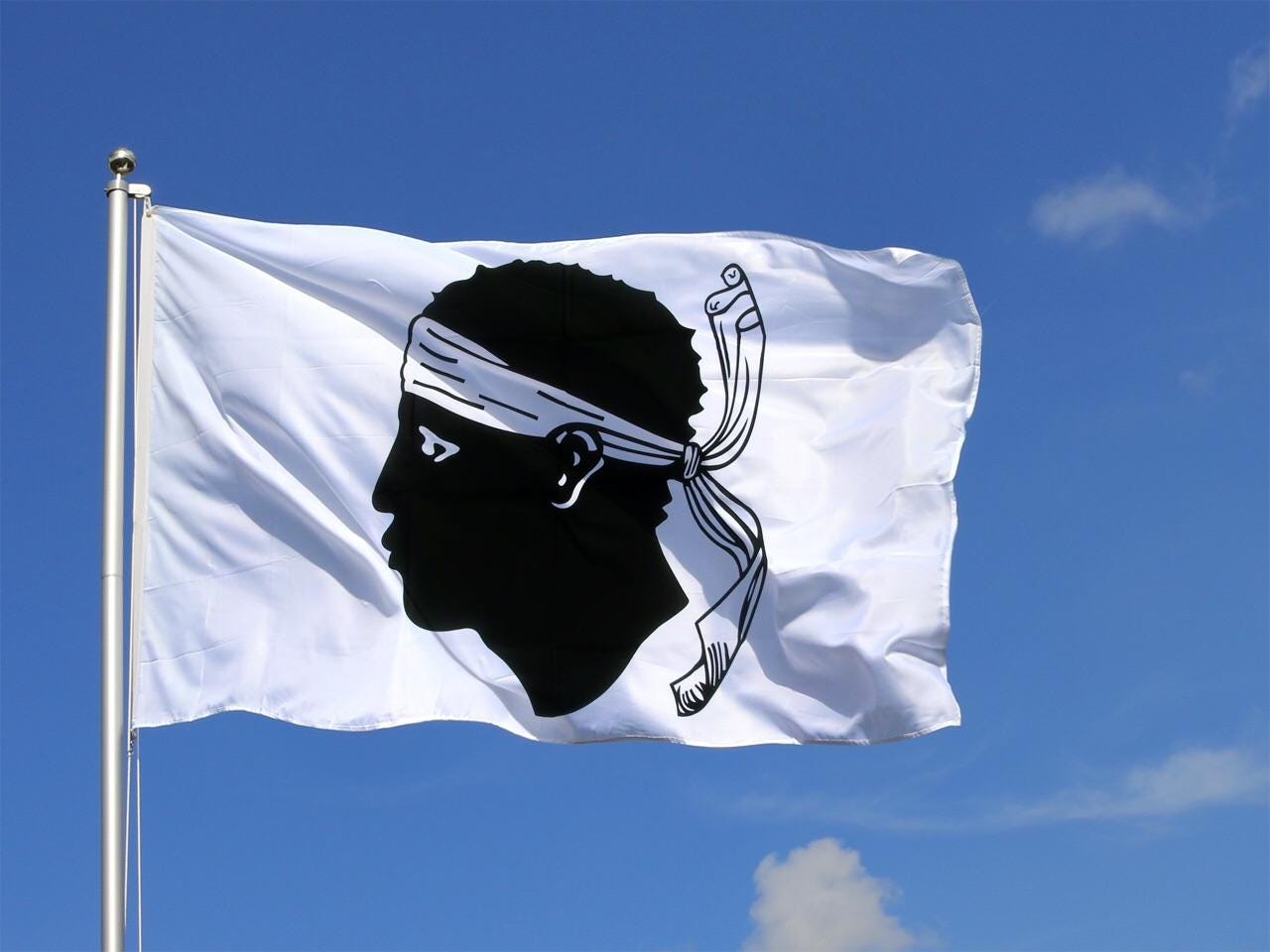
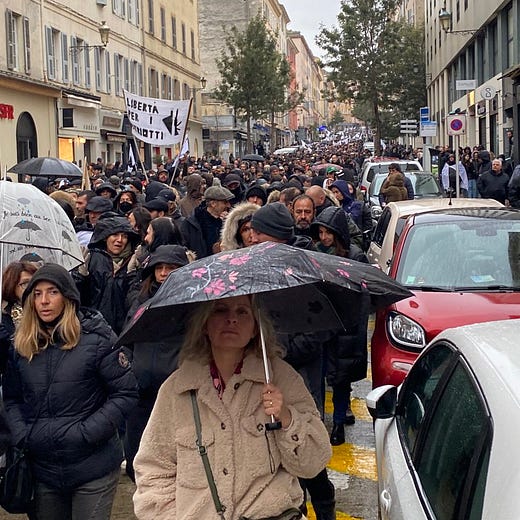
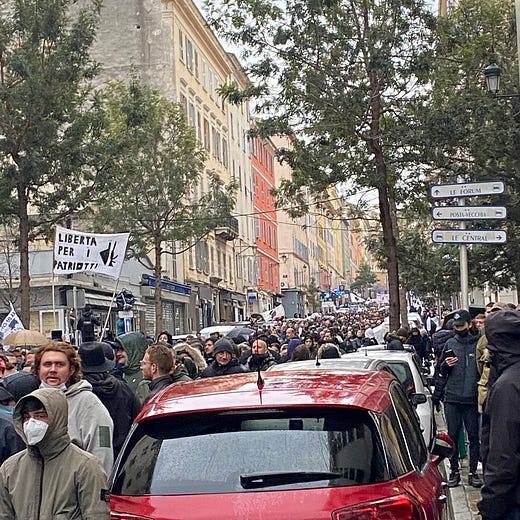
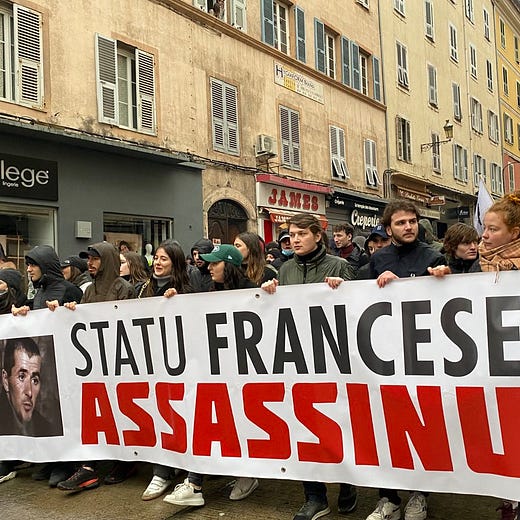
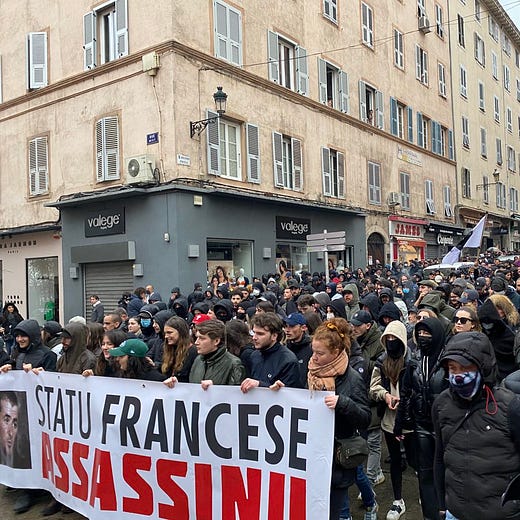

As a minor point of interest, Basque people generally hate it when you call their country a "region."